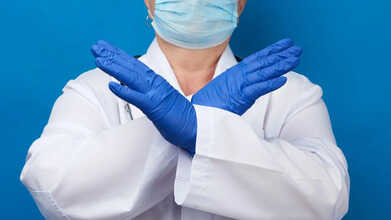- Health Conditions A-Z
- Health & Wellness
- Nutrition
- Fitness
- Health News
- Ayurveda
- Videos
- Medicine A-Z
- Parenting
- Web Stories
Google Doodle: Celebrate Popcorn's Crunchy Delight Recipes And Its Nutritional Benefits

Google doodle Today: Don't get popped (Credit: Google)
Popcorn lovers rejoice! Google has rolled out a delightful interactive multiplayer Doodle today, celebrating one of the world’s most cherished movie snacks. This special Doodle invites users globally to join a fun-filled game, coinciding with the anniversary of Thailand's impressive achievement in 2020, when the nation created the world’s largest popcorn machine.
This Google Doodle not only serves as a tribute to popcorn but also introduces a playful element, allowing users to compete against one another in an engaging global match. The game has already set a milestone for Google Doodles, achieving the highest number of participants in a single match.
How to Play the Google Doodle Popcorn Game
Participating in this exciting game is straightforward:
- Click on the Google Doodle celebrating popcorn.
- You’ll be greeted with a brief explanation of the game and its mechanics. The primary goal? Avoid getting popped while advancing through various levels.
- Players can compete with friends or global users. Select “solo mode” for an individual challenge or “squad mode” to enjoy playing with friends.
- Dive into the game, and may the best player win!
Popcorn, often regarded as an irreplaceable companion for moviegoers and binge-watchers, has a fascinating history. Believed to have been cultivated by Mesoamerican civilizations, popcorn gained significant popularity in the United States during the 1800s. Interestingly, it was once even consumed as a breakfast cereal! The invention of the popcorn maker in the 1890s marked a turning point, making it widely accessible at fairs, markets, and eventually, movie theaters.
Today, popcorn is enjoyed globally in various forms. In Brazil, it’s known as “pipoca,” typically served plain or lightly salted. Japanese popcorn may come topped with nori, while Middle Eastern variations include za’atar flavors. Canadians often indulge in sweet maple popcorn as a nod to their national symbol.
Popcorn Nutrition
While popcorn can be a nutritious snack, its health benefits largely depend on its preparation. When air-popped and prepared simply, popcorn serves as a low-calorie, whole grain treat. Here’s a quick nutritional breakdown:
Calories: Approximately 164 for a three-cup serving of air-popped popcorn without added salt or butter.
Fat: About 9.24 grams, with only 1.66 grams of saturated fat.
Sodium: A mere 17.3 milligrams.
Carbohydrates: Around 19.11 grams.
Fiber: Approximately 3.3 grams.
Protein: 2.96 grams.
In contrast, a medium-sized order of movie theater popcorn with butter can contain upwards of 1,190 calories and a staggering 107 grams of fat, demonstrating how preparation significantly alters its nutritional profile.
Health Benefits of Popcorn
1. Popcorn is an excellent source of dietary fiber, particularly insoluble fiber, which promotes digestive health and helps maintain a feeling of fullness.
2. When prepared with healthy ingredients, popcorn can be a low-calorie snack option. Its large serving size compared to calorie density makes it ideal for weight management.
3. Popcorn contains polyphenols, powerful antioxidants that combat oxidative stress and may lower the risk of chronic diseases.
Healthy Popcorn Recipes
To make the most of this delightful snack, here are some healthy popcorn recipes:
Air-Popped Popcorn

Simply pop corn kernels using an air popper. Toss with a small amount of olive oil and sprinkle with your choice of seasonings (like nutritional yeast for a cheesy flavor).
Spicy Lime Popcorn

Air-pop popcorn and drizzle with lime juice. Sprinkle with chili powder and a pinch of sea salt for a zesty kick.
Cinnamon Sugar Popcorn

Toss air-popped popcorn with a light spray of coconut oil, then mix with cinnamon and a touch of coconut sugar for a sweet treat.
FDA Recalls Popular Chocolate Snack Over Laceration Risk: What You Need To Know

Credits: Canva
True Fru product recall: The U.S. Food and Drug Administration (FDA) announced that Tru Fru, LLC is voluntarily recalling certain Tru Fru freeze-dried products due to the possible presence of metal. The recall was prompted by Georgia Nut Company, which manufactures these products for Tru Fru, after a customer raised concerns.
Tru Fru produces chocolate-covered fruit snacks, including freeze-dried and frozen fruits like strawberries, bananas, and pineapple, coated in dark, milk, or white chocolate, and some varieties with peanut butter.
True Fru Product Recall: How To Recognize the Recalled Items?
The FDA published the recall notice on September 29, 2025. It covers specific batches of Tru Fru Freeze-Dried Strawberries in Dark & White Chocolate and Strawberries & Crème, available at major retailers nationwide, including Albertson’s, CVS, Food Lion, H-E-B, Hungryroot, Ingles Markets, Kroger, Stew Leonard’s, and Target, as per All Recipes.
To check if your product is affected, look for the 10-digit manufacturing code on the back of the package. The first four characters of the code identify the recalled batches.
Affected Products Include:
1) Tru Fru Freeze-Dried Strawberries in Dark & White Chocolate (3.4 oz)
UPC: 850048358270 | Item #: 10300458
Manufacturing codes starting with: 517B–532B (see full list above)
2) Tru Fru Freeze-Dried Strawberries in Dark & White Chocolate (1.7 oz)
UPC: 850048358331 | Item #: 10300442
Manufacturing codes starting with: 514A–526A
3) Tru Fru Freeze-Dried Strawberries in Dark & White Chocolate (13 oz)
UPC: 850048358379 | Item #: 10300474
Manufacturing codes starting with: 515A–516C
4) Tru Fru Freeze-Dried Strawberries & Crème (3.4 oz)
UPC: 850048358249 | Item #: 10300455
Manufacturing codes starting with: 520B–524E
True Fru Product Recall: What Did The Company Say?
The company warned that hard or sharp foreign objects in their food products could cause injuries, including cuts or punctures to the mouth, tongue, throat, stomach, or intestines, as well as damage to teeth and gums. The recall affects products distributed across the U.S. at major retailers such as Albertson’s, CVS, Food Lion, H-E-B, Hungryroot, Ingles Markets, Kroger, Stew Leonard’s, and Target. The recall was prompted by a customer report, and so far, no injuries or illnesses have been reported according to the FDA.
True Fru Product Recall: What to Do If You Have A Recalled Product?
Do not eat any of the recalled items. They should be discarded immediately. Customers seeking compensation can fill out Tru Fru’s online form to receive a coupon. No injuries have been reported so far, but if you have any concerns, contact your doctor. Swallowing metal pieces can cause cuts or tears in the mouth, throat, stomach, or intestines, and can damage teeth or gums.
Tru Fru is not the only recent recall due to foreign object risks. The USDA recently issued a health alert for a ready-to-eat pasta meal sold at Walmart because of possible listeria contamination.
The recalled product is Marketside Linguine with Beef Meatballs and Marinara Sauce, sold in 2 oz plastic trays. The affected “best if used by” dates are September 22, 24, 25, 29, 30, and October 1, 2025. These were sold nationwide at Walmart. Consumers are advised not to eat the pasta and should either throw it away or return it for a full refund.
Premature Baby In Alberta Dies From Measles As Cases Rise In Canada

(Credit-Canva)
The province of Alberta has reported its first death linked to measles since the highly contagious virus resurfaced in Canada. An infant died shortly after birth when the mother had contracted measles during pregnancy. This tragic event follows a similar case in Ontario in June. Health Minister Adriana LaGrange called the loss "heartbreaking" and urged the public to take protective steps, emphasizing the extreme risks posed by measles to certain groups.
The National Foundation for Infectious Diseases (NFID) explains that measles is a highly contagious disease caused by a virus. This virus lives in the mucus found in a sick person's nose and throat.
Measles spreads very easily through the air when an infected person coughs, sneezes, or talks. Up to 90% of people nearby who haven't had the vaccine will likely get infected. A sick person can spread measles to others starting four days before the rash appears and for four days after it appears.
Are Measles Cases Rising?
According to the Government of Alberta, measles is back, and it's spreading quickly. Since March, there have been nearly 2,000 cases reported in Alberta. This is a huge number for a disease that was supposed to be gone from the country since 1998.
Most of the sickness is happening in the southern and northern parts of Alberta. More than 150 people have been so sick they needed to be admitted to the hospital. Out of those, 15 people needed care in the intensive care unit (ICU).
Who is Getting Infected With Measles?
The vast majority of the people who have gotten sick are children and teenagers. The data shows that 89% of those infected had not been vaccinated against measles. Measles spreads so easily that just one sick person can infect up to 18 people who haven't had their shots.
How Serious Is Measles?
The NFID explains that about 1 out of 5 unvaccinated people in the U.S. who get measles will need to be hospitalized. This risk is highest for children under age five.
- 1 out of every 1,000 people with measles will get brain swelling, which can cause permanent brain damage.
- As many as 1 out of 20 children with measles will get a serious lung infection called pneumonia.
- Sadly, 1 to 3 out of every 1,000 people who get measles will die.
The number of cases has been high recently. As of October 2025, there have been 1,544 confirmed cases across 42 US states, with three confirmed deaths. This is the highest number of cases since the disease was eliminated (gotten rid of) in the U.S. in the year 2000. Most of these recent cases (92%) were in people who were not vaccinated.
Measles Symptoms and Immune System Risk
Measles is one of the easiest viruses to catch because it travels through the air. You can get it just by breathing the air near a sick person.
The symptoms to watch for are:
- A very high fever.
- A cough, a runny nose, or red, watery eyes.
- A classic rash that starts on the face and spreads down the body.
Measles can give your immune system "amnesia," which means it wipes out the memory of old infections. You become vulnerable again to common sicknesses like the flu or colds that you had already fought off and beaten in the past. This makes you more likely to get seriously ill from other things for months or even years after you recover from the measles.
How Can You Prevent Measles?
The best defense against measles is the vaccine. The shot is very good at stopping the infection and is free in Alberta.
Before Getting Pregnant
If you are planning to have a baby, you should make sure you have had two doses of the measles vaccine before you get pregnant. You cannot get the shot while pregnant.
Check Your Status
If you don't know if you've been vaccinated, you can call 811 (Health Link) for free information.
Trump Administration Quietly Approves Abortion Pill Mifepristone Amid RFK Jr.’s FDA Safety Review

Credits: Canva
The Trump administration has quietly approved a new generic version of the abortion pill mifepristone, a move announced by the Food and Drug Administration this week that has drawn sharp criticism from anti-abortion leaders.
The decision comes less than two weeks after Health and Human Services Secretary Robert F. Kennedy Jr. and FDA Commissioner Martin Makary confirmed a review of abortion pill safety, a review initially welcomed by anti-abortion activists. Now, those same leaders are questioning the administration’s commitment to their cause, marking one of the first notable pushbacks Trump has faced from his usually loyal socially conservative base.
Trump Administration Quietly Approves Generic Mifepristone, Sparking Backlash
Federal regulators have approved a new generic version of the abortion pill mifepristone, a routine regulatory step that immediately drew criticism from anti-abortion groups and politicians aligned with the Trump administration.
The approval was announced by Evita Solutions, the drugmaker, on its website. The company’s low-cost version of mifepristone is approved for ending pregnancies up to 10 weeks gestation. Students for Life Action, an anti-abortion organization, responded to the news calling the move “a stain on the Trump presidency” and describing it as further evidence that the “deep state at the FDA must go.”
The decision shows the ongoing tension between expanding access to abortion medication and opposition from socially conservative groups who remain critical of regulatory agencies’ role in approving such drugs.
What Is Mifepristone?
According to the FDA, mifepristone blocks the hormone progesterone, which is essential for a pregnancy to continue. Used in combination with misoprostol, it can safely end an intrauterine pregnancy up to ten weeks gestation (70 days or less since the first day of the last menstrual period).
The approved dosing schedule is:
- Day 1: 200 mg of mifepristone taken orally
- 24–48 hours later: 800 mcg of misoprostol taken buccally (in the cheek) at an appropriate location
- 7–14 days later: follow-up with a healthcare provider
Mifepristone: Who Will Make It?
The generic version will be produced by Evita Solutions LLC, a company that says its mission is to “normalize abortion” and make it “accessible to all.” The FDA confirmed the approval, stating that the submitted application contained sufficient data to meet federal standards.
Mifepristone: Safety and Controversy
Decades of peer-reviewed studies show that serious adverse reactions to mifepristone occur in fewer than 0.5 percent of patients, and the drug has been FDA-approved and widely used for over 20 years.
Despite this, earlier this year, a report by the Ethics and Public Policy Center, a right-wing think tank, questioned the safety of the pill, claiming serious complications were 22 times higher than previous estimates and urging the FDA to reconsider its approval.
This latest approval underscores the ongoing tensions in U.S. abortion politics, as the Trump administration’s decision to quietly greenlight generic mifepristone clashes with the expectations of socially conservative supporters.
© 2024 Bennett, Coleman & Company Limited

